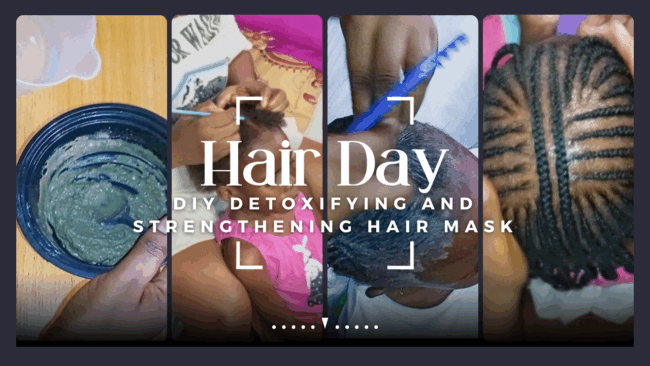Hair masks have proven over time to promote hair growth and length retention, moisturize, strengthen, and improve fullness. As a mum of a 7-year-old with type-3-hair hair, that has suffered from stunted growth, I have decided to be intentional with the type of masks I use on my child’s hair. Recently, I started experimenting with DIY masks and hair treatments to boost the health of my daughters’s hair and I must say that I am impressed with the results.
For this hair mask recipe, I used only four powders and water, and below are their benefits:
Benefits of bentonite Clay for Hair
Bentonite clay is a fine-textured natural clay made from old volcanic ash. Some people use it to treat rashes or acne, or for other medical or aesthetic purposes. Bentonite Clay has been used for thousands of years to eliminate toxins and oils from the body as well as pollutants from the skin. Additionally, studies have indicated that it has some positive effects on natural hair, can promote hair development, and can keep the scalp healthy. Here are some benefits of using bentonite clay for healthy hair.
- promotes hair great
- conditions hair and reduces frizz
- adds shine
- helps define curls
- removes dandruff
- deep cleanses the hair by drawing out toxins, chemicals, and buildups from the hair when you wash the clay off
Essential nutrients in bentonite clay: sodium, calcium, potassium, Magnesium, Silica, Sodium, Copper, and Iron.
Benefits of Amla for Hair
Amla, also known as the Indian Gooseberry, is a small, rounded fruit that grows on a tree of the same name. Despite its astringent and sour flavor, this fruit is incredibly nutritious. Amla powder is created by crushing the leaves of this tree and has been used in Ayurvedic medicine to treat a variety of illnesses in addition to being used in food. The powder is also known to have anti-inflammatory effects, which has led to its use in skin and hair care products. Amla is regarded by Ayurveda as a “divine medicine,” and is advised for restoring the luster and health of your hair. It is said that applying amla powder to hair will make it healthier, shinier, and darker.
Here are some benefits of Amla for hair:
- Promotes hair growth and thickness
- Adds shine, luster, and bounce
- Prevents premature greying of hair
- darkens hair.
Essential nutrients in Amla: alkaloids, flavonoids, amino acids, 5alpha reductase (enzymes), Vitamin C, and polyphenols (compounds).
Benefits of rice powder/flour for Hair
There are significant amounts of para-aminobenzoic acid, ferulic acid, and allantoin in a simple bowl of rice flour. These components provide it with potent qualities that make it very effective to use to maintain and repair beautiful skin and hair.
- exfoliates the scalp, and gets rid of dirt and oil build-up.
- eliminates the existence of fungal infections and germs due to its antiseptic properties.
- strengthens hair, thereby reducing breakage.
Essential nutrients in rice powder: para-aminobenzoic acid, ferulic acid, allantoin, folic acid (vitamin B9), niacin (vitamin B3), magnesium, and inositol (vitamin B8)
Benefits of Henna for Hair
Henna is one of the components of hair care that Indians introduced to the rest of the globe. For many years, if not centuries, Indian women have used henna to take care of their thick hair. Henna ought to be your go-to component if you wish to get rid of your grey hair naturally but are allergic to chemical colors. It is abundant in tannins, a plant ingredient that gives tea its deep coloring. But henna has advantages that go beyond preventing death. Here are some benefits of henna for hair:
- treats dandruff
- helps fight hair loss-related issues
- reduces premature greying of hair by protecting natural hair color
- softens hair due to the presence of vitamin E
- helps to rectify split ends and dryness
- promotes the growth of long thick tresses
Essential nutrients in henna: Hennea is rich in proteins, antioxidants, and vitamin E
Shop Botanical Herbs and powders here
Bentonite Clay (here), rice powder (here), Amla (here), and henna (here)
In conclusion, Hair masks are best applied once or twice a month depending on your hair type. Always moisturize and hydrate hair with quality products to maintain an overall healthy tress.

I have personally tried and loved the results for rice flour mask. You can also use rice water as a rinse for softer, shinier and healthier hair and scalp. It can be used as a final rinse after hair wash.
Excellent mask for detoxifying and nourishing hair and scalp. I added yogurt to prevent drying and absolutely loved the results. Those who don’t have dark locks should skip henna in this recipe to prevent staining.
I’m glad you liked it. I agree with the henna tip too
Thanks Winnie… I really like your recipe… Thanks so much for sharing!
I don’t think the title of your article matches the content lol. Just kidding, mainly because I had some doubts after reading the article.
What do you have doubts about?